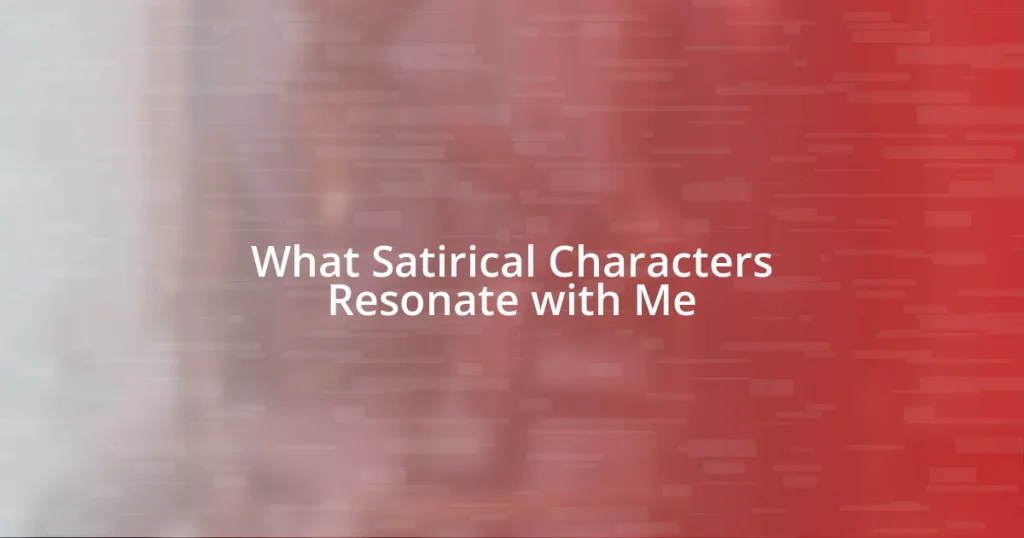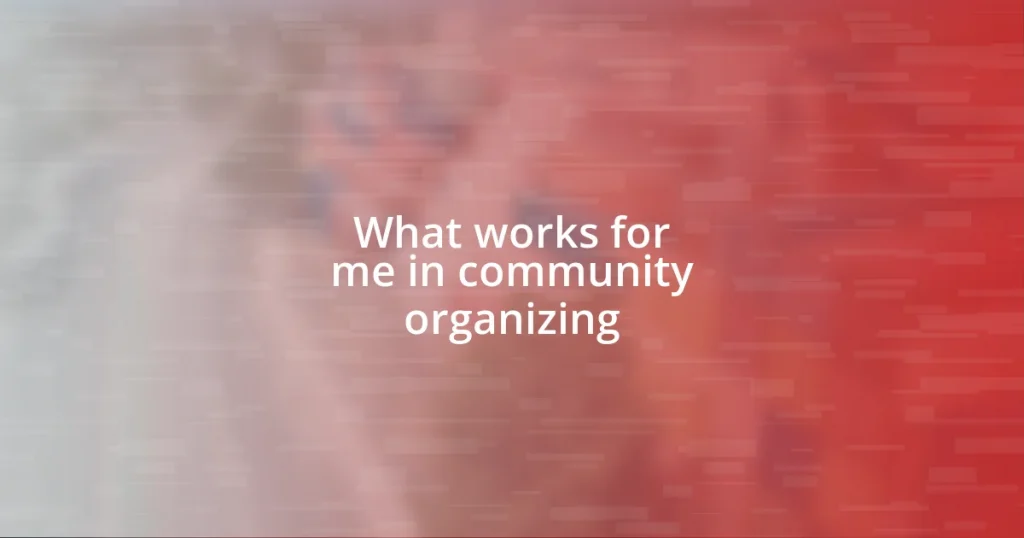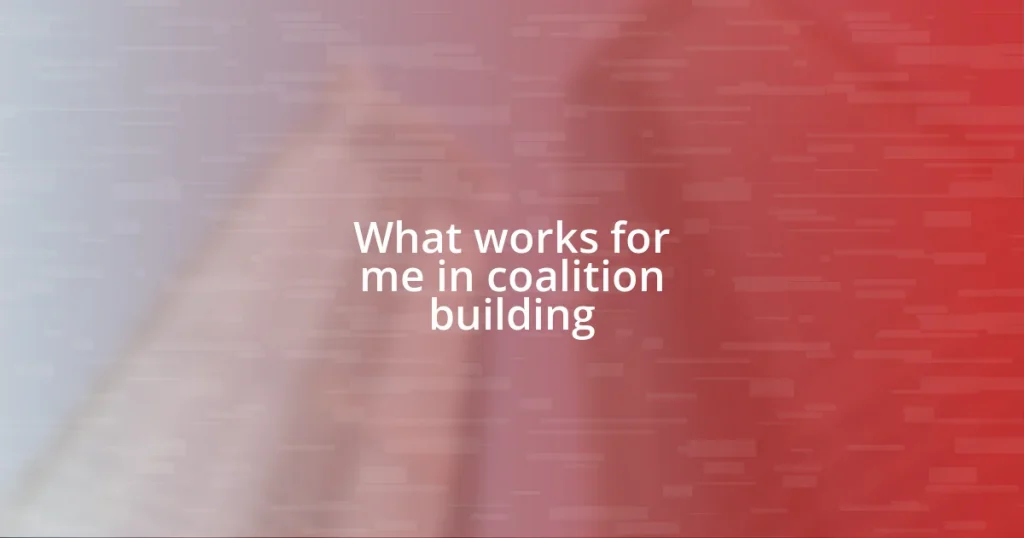Key takeaways:
- Satirical characters act as reflections of societal quirks and personal flaws, encouraging self-reflection and humor in recognizing our imperfections.
- Understanding character motivations, such as seeking validation or fear of failure, reveals relatable human experiences that can transform discomfort into connection.
- Connecting with cultural contexts enhances the relatability of satire, making everyday interactions and societal norms more accessible and humorous.
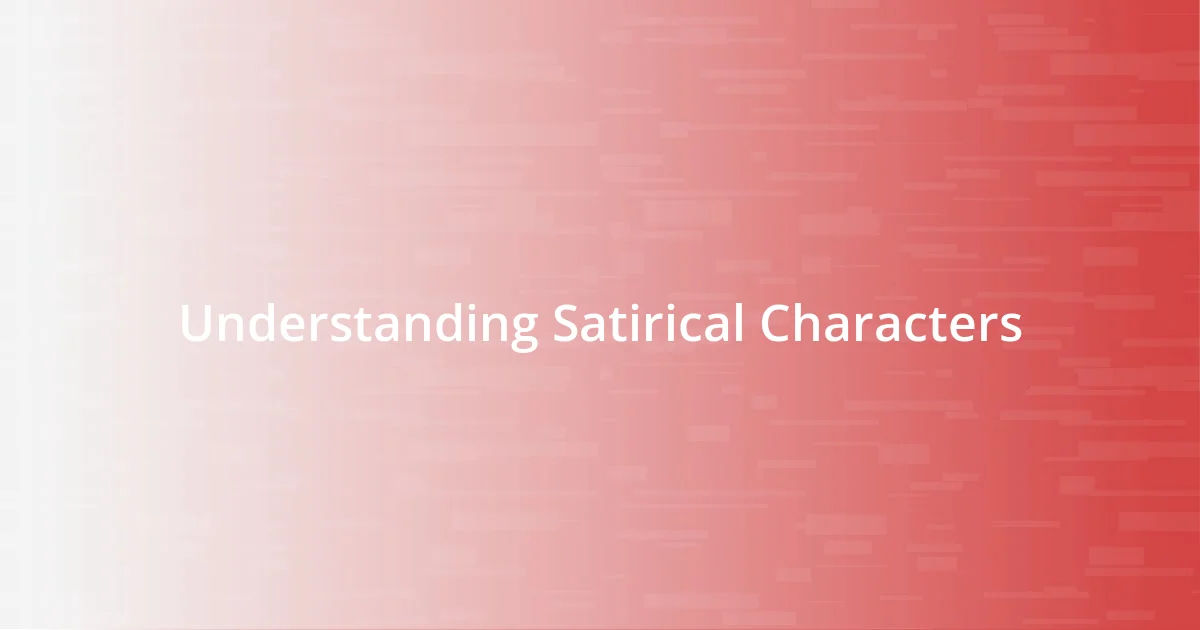
Understanding Satirical Characters
Satirical characters serve as mirrors, reflecting not just societal quirks but also our individual follies. I remember laughing out loud at a character in a satirical show who was a notorious procrastinator, and in those moments, I found myself cringing because I could see a bit of myself in that portrayal. Doesn’t it feel strangely comforting to recognize our flaws through humor?
What strikes me most is how these characters often exaggerate traits that are all too familiar. The ridiculousness of their situations evokes a mix of amusement and self-reflection. For instance, recalling a friend who seems perpetually late to everything, I can’t help but wonder—are we all just a little like that character sometimes, fumbling through life, unaware of how ludicrous we appear?
As I dissect satirical characters, it’s fascinating to see how they highlight societal absurdities. They push boundaries, making us question norms and values that we might normally accept without a second thought. Have you ever found yourself pondering, after watching a satirical piece, why we do the things we do? That’s the power of satire—encouraging a deeper look at our lives while we share a laugh.

Identifying Your Personal Resonance
Identifying what resonates with us personally in satirical characters can be a revealing experience. When I reflect on my own responses, I recall a character who exemplified the overzealous office worker, meticulously organizing everything to an absurd degree. I laughed, but it also struck a chord; I often find myself obsessively checking off tasks on my list. It’s almost like the character held up a funhouse mirror, exaggerating my tendencies until I couldn’t help but chuckle at myself.
Watching these individuals in their outrageous scenarios often leads me to think more deeply about how they reflect aspects of my personality or life experiences. For instance, I once related heavily to a character who was a witty cynic, always offering snarky remarks as a defense mechanism. That character made me confront my own use of humor to cope with uncomfortable situations, showing me that it’s okay to laugh at life’s imperfections while also acknowledging my vulnerabilities.
As I continue to explore my connections with various characters, I find that these reflections can sometimes spark moments of realization. Have you ever felt a profound sense of understanding after watching someone navigate their chaos? For me, these moments remind me that recognizing our flaws isn’t weakness—it’s a chance for growth, packaged in humor. I believe finding humor in our shortcomings not only makes life more bearable but also allows us to connect with others on a more authentic level.
| Character Trait | Personal Connection |
|---|---|
| Procrastination | Viewing my own tendency to delay tasks |
| Overzealousness | Recognizing my obsession with organization |
| Cynicism | Understanding my use of humor as a defense |

Types of Satirical Characters
Satirical characters come in various forms, each embodying different aspects of human behavior and societal quirks. I find it intriguing how some characters caricature extreme traits, making them both hilarious and painfully relatable. For example, there’s the oblivious know-it-all—someone who insists on sharing their unsolicited opinions regardless of the context. Watching them stumble through conversations reminds me of acquaintances I’ve encountered, reinforcing the notion that hubris can often lead to embarrassing situations.
Here’s a quick list that illustrates some common types of satirical characters:
- The Clueless Leader: A figure who confidently makes decisions without any real understanding, often leading to chaotic results.
- The Self-Important Celebrity: Someone who seeks constant admiration, even for the most mundane achievements, reflecting our obsession with fame.
- The Gloomy Pessimist: This character brings humor out of hopelessness, often portraying an exaggerated sense of despair that leads to unexpected comedic relief.
- The Overachieving Perfectionist: They strive for unattainable goals, making their journey both cringe-worthy and amusing as they realize their absurdity.
Each type resonates with different facets of my life and experiences. I vividly recall a moment watching a self-important celebrity character on a show; they were hosting a gala while oblivious to the disasters happening around them. It was painfully funny but also made me reflect on how sometimes we all get so wrapped up in our own lives that we forget to look around and appreciate reality. I think that’s the beauty of satirical characters—they invite us into a shared experience of laughter, making those truths a little easier to bear.
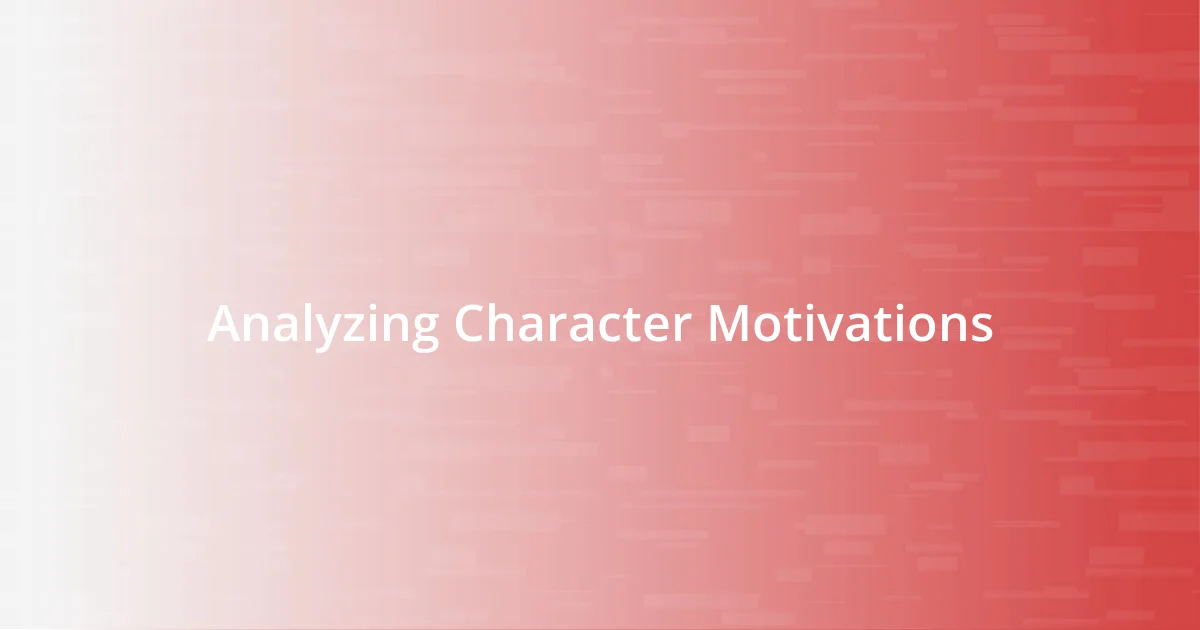
Analyzing Character Motivations
Understanding the motivations behind satirical characters reveals so much about what makes them resonate with us. Take, for instance, a character who constantly seeks validation. I remember encountering one who bumbled through life, desperately trying to impress others but constantly falling short. This portrayal struck me because it mirrored my own youthful insecurities and the lengths I went to for approval. It’s a reminder of how relatable these motivations can be—who hasn’t craved validation at some point?
Another compelling motivation is the fear of failure. There’s that hilarious character who tries every ridiculous scheme but inevitably flops. Watching their relentless attempts felt oddly comforting. I thought back to my own experiences, like the time I launched a half-baked initiative at work, resulting in a spectacular flop. It’s comforting to see such exaggerated failures on screen because they highlight our shared human experience: we all stumble, yet we keep trying. Isn’t it a little freeing to laugh at those missteps?
Moreover, the drive for acceptance can be a powerful motivation in some characters. I am often drawn to those who navigate social absurdities with a mix of wit and desperation, much like I did during my clumsy teenage years. Reflecting on those moments, I can’t help but see how satirical characters illuminate our struggles for belonging. They capture our anxieties and desires through humor, ultimately inviting us to embrace our quirks while navigating life’s unpredictable landscape. Isn’t it fascinating how laughter can turn discomfort into connection?

Reflecting on Personal Experiences
Reflecting on personal experiences often brings a wave of laughter mixed with a hint of embarrassment. I vividly recall a time when I tried too hard to impress friends during a game night. My overzealous enthusiasm resembled that of a clueless leader in a sitcom—interrupting jokes and offering unsolicited strategies. It felt cringe-worthy in the moment, yet I couldn’t help but chuckle at how I became the unwitting star of my own satirical scene.
In another instance, I remember sharing an idea at work, only to have it flounder drastically. It felt remarkably similar to that desperate character who launches a hilariously ridiculous plan, fully unaware of the impending disaster. The blow to my ego was sharp, but instead of wallowing, I realized that everyone has “flops.” Sharing that story with colleagues transformed our collective awkwardness into laughter, reminding me that failure is just part of the journey. Don’t you find that often when we accept our blunders, they become the most relatable chapters in our lives?
Lastly, navigating social situations has always been a challenge for me. There’s a palpable anxiety that bubbles up during gatherings, echoing the life of the overachieving perfectionist—constantly striving to seem effortless. I still remember an awkward moment at a friend’s party, fumbling through conversations, desperately trying to hold it together. It’s fascinating how these experiences resonate so deeply with me, reflecting the absurdity of our attempts to fit in. Isn’t it comforting to realize we’re all just trying to find our place in this chaotic world, often with a humorous twist?

Connecting with Cultural Contexts
Connecting with cultural contexts makes satirical characters come alive in a way that resonates profoundly with our individual experiences. I recall watching a series that humorously critiqued the corporate world, and it struck a chord with me. The characters, all caricatures of various office personalities, reminded me of my own workplace encounters—like that over-inflated ego who constantly seeks praise. Isn’t it interesting how satire allows us to see our everyday dramas played out in exaggerated forms, making the uncomfortable relatable?
Cultural nuances also play a vital role in the humor we connect with. I remember laughing uncontrollably at a sketch that poked fun at generational divides in technology use. Each character, from the bewildered grandparent to the overly confident millennial, mirrored real conversations I’ve had with my family. It hit home because it conveyed the frustration and humor of trying to bridge those gaps. Doesn’t that reflection deepen our appreciation for what we often take for granted in our interactions?
Ultimately, the richness of cultural contexts in satire lies in how they mirror our societal quirks and norms. I’ve had moments in social gatherings where jokes fell flat, echoing the comedic misadventures of characters I adore. I think about a time when I misinterpreted a shared joke at a friend’s birthday party, creating an awkward silence instead of laughter. The way these characters navigate similar miscommunication makes me feel less alone in those moments. Wouldn’t you agree that recognizing our own stories within these narratives makes them all the more compelling?

Applying Satirical Insights to Life
Applying satirical insights to life often serves as a mirror reflecting our own quirks and follies. I remember a time when I got caught in a heated debate with friends about a trivial issue—like whether a hot dog is really a sandwich. My fervor resembled that of a satirical character whose life seems to hinge on absurd arguments. The ridiculousness of it all hit me; how many times do we invest ourselves in the most trivial things, only to look back and laugh?
There’s something cathartic about embracing satire in our everyday moments. Once, I was running late for a meeting, and in my rush, I accidentally spilled coffee all over my notes—an absolute comedy of errors! In that moment, I felt like a character in a sitcom, fumbling around while trying to salvage my dignity. It made me realize that sometimes the chaos of life is what truly brings us together. Have you ever found humor in your mishaps? I truly believe these are the moments that connect us.
Using satire as an insight guide helps me approach life with a lighter heart. I often reflect on the frequency of inflated self-images I encounter, reminiscent of characters who see themselves as the protagonist in their own comedy. Recently, during a day at the park, a fellow jogger veered off the path because they were too busy filming themselves running. I couldn’t help but chuckle; it was a satirical moment that reminded me of the lengths we go to curate our lives for others. How often do we find ourselves caught in performance mode? Recognizing these moments allows us to lighten up and embrace our shared imperfections.










